PROVINCETOWN – It is 100 years almost to the day that Eugene O’Neill’s first play debuted in Provincetown, marking what some say was the birth of modern American drama. Remarkably enough, Provincetown looks quite similar to the way it looked 100 years ago, with mostly the same street layout and many of the same historic homes lining Commercial Street.
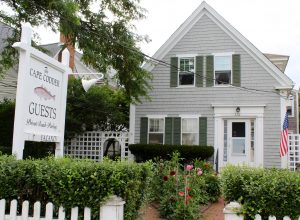
The Cape Codder Guesthouse in Provincetown’s East End is near two major Eugene O’Neill places of interest.
That’s what made it possible on a recent night to stay in the Cape Codder guesthouse (570 Commercial Street) diagonally across the street from where O’Neill once lived—a plaque marks the spot—and to walk in the great playwright’s proverbial footsteps to a sturdy but weathered Wharf House at the end of Macmillan Pier, and, as boats passed by and the fog rolled in, to hear O’Neill’s own words in his play “Anna Christie”—words he wrote just blocks from this wharf, about these fishermen, about Provincetown, about life.
Marking the centennial summer of Eugene O’Neill’s first play produced in Provincetown, “Anna Christie,” a production of Provincetown Dramatic Arts, runs at the Wharf House at the Provincetown Marina just until August 8 and is well worth seeing, especially for the evocative setting but also for the passion the actors (pictured in the photo above) bring to the challenging task.
While watching the play and feeling the movement of the sea, smelling the strong, pleasing odor of fish, with the sight of an occasional passing fishing boat just out the wharf door beyond the stage, feeling a chill in the air—it’s time travel, Provincetown-style.
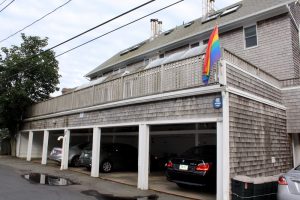
A building much converted since Eugene O’Neill’s time in Provincetown was once a place where the playwright lived, according to a plaque.
The play, “Anna Christie,” won O’Neill one of his four Pulitzer prizes. It is said that he wrote it while living at a home on nearby Masonic Place in Provincetown, where another plaque bearing O’Neill’s connection to Provincetown can be found. The play was noteworthy for its use of colloquial language. Between Anna’s plainspoken dialogue, her father’s thick Swedish accent and fisherman’s jargon, and the sailor/love interest Mat Burke’s Irish brogue, the play is a mixing pot, much the way Provincetown is now and was then.
With a classic “hooker with a heart of gold” plot, it contains a line that will be forever linked to Greta Garbo, who played the lead character in the 1930 MGM film: “Give me a whiskey, ginger ale on the side — and don’t be stingy, baby.”
That was O’Neill—straightforward as a kick in the head. “Anna Christie” is a play about a strong woman who breaks all the stereotypes of the era—not a bad theme for a town that breaks all stereotypes, all the time.
O’Neill had several homes while living on and off in the bohemian town at the Cape’s tip. Most famously, he lived for a time in the Peaked Hill Bars Lifesaving Station deep in the isolated Provincelands dunes.
But while living in town, he at one time lived at a home at 577 Commercial Street in the East End that bears the plaque in tribute. The round blue plaque, set high on the building reads, “Eugene O’Neill 1888-1953 Dramatist Lived Here.”
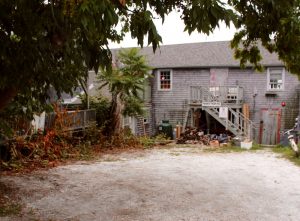
The Beachcomber, a private club for artistic types. Writer Sebastian Junger is said to be a member now.
Multiple conversions of the property have unfortunately resulted in the house looking from the street mostly like a garage. And yet, the connection is still there.
Just a couple doors west is a house with a similar plaque, this one marking the former home of novelist John Dos Passos (1896-1970). Between that house and a three-car clamshell-covered parking lot that serves the Cape Codder Guesthouse across the street, is a bronze plaque on a granite pillar that marks the former location of Lewis Wharf where O’Neill first had a play produced. That play “Bound East for Cardiff” was performed on July 28 and July 29 in 1916.
That was the year after O’Neill arrived on this spit of sand that had, beginning in the late 19th century, become populated by artists, writers and free-thinkers sharing the quaint village with a proud community of Portuguese fisherman and Yankee stalwarts.

Where the Lewis Wharf once stood, the site where Eugene O’Neill’s first play was performed, there is now only a spectacular bay view.
The bronze plaque reads: “In 1915 on a wharf extending from this site, a fish shed owned by Mary Heaton Vorse was converted to a theater by a group later named The Provincetown Players.
“On July 28, 1916, the Players staged ‘Bound East for Cardiff,’ the first production of a play by a young and then unknown author, thus launching the career of Eugene O’Neill as a playwright and changing the course of modern drama in America.” The plaque was installed in 1988 by Provincetown Playhouse, Adelle R. Heller, Barbara S. Mayo, and M.T. Moore Jr.
For those searching for O’Neill in Provincetown, there are the obvious places of pilgrimage, for instance, the plaques marking the locations where O’Neill and his friends, including many famous artists and writers, lived back then. There are also the dunes where the Coast Guard Station once stood before falling into the Atlantic Ocean after one too many storms. Well worth a visit, by foot (a major hike) or Arts Dunes Tours.
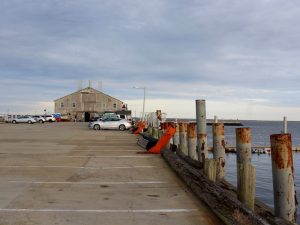
The Wharf House at the Provincetown Marina where Eugene O’Neill’s play “Anna Christie” was performed.
But counted among possible places for O’Neill pilgrims to convene with the great playwright, consider the places where he might visit if, by some stretch of the imagination, he were alive today.
First on that list has to be Old Colony Tap, because it is the best old-school bar in town, the kind of place a bargeman, like Anna Christie’s father in the play, might wander into.
There’s also the Beachcomber’s Club, down on the east end, an unmarked private club in an unobtrusive two-story structure set up 100 years ago as a place for artistic types to drink. O’Neill’s friend the famous Communist John Reed was said to have been there, so O’Neill most likely made an appearance. You can oogle it from the street. It is not open to the public.
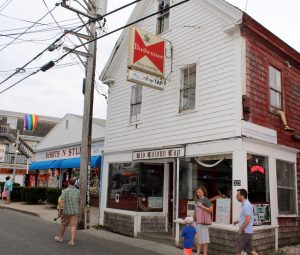
Old Colony Tap is the type of bar that a man like Anna Christie’s father, an old sailor, might wander into. The leg hanging out the side wall window helps to advertise a sandal business.
O’Neill also likely spent time in the Provincetown Art Association and Museum, a place, again, where artistic types would hang out 100 years ago, and still do today.
Searching for traces of O’Neill means searching for old Provincetown and that leads to two galleries that focus on art from the beginnings of the art colony 100 years ago, all the way to art of the present day: Bakker Fine Art Gallery on the east end and Julie Heller Gallery, set in a beach shack on the sand on Gosnold Street—really more like an alley ending at the beach—near the center of town. Heller’s parents at one time owned a nearby wharf shack that housed the Provincetown Playhouse on the Wharf, so there are unmistakeable echoes of O’Neill there down that alley that leads to the beach.
O’Neill was known to enjoy a beverage now and again, so in addition to Old Colony Tap, he might enjoy Harbor Lounge, with a sign that reads, “Just Booze. No Food.”
Another sign that seems inspired by the great playwright points to Sage Inn and Lounge: The sign states: “Cocktails: Cause No Great Story Ever Started With A Salad.” Words to live by—for those searching for the great storyteller O’Neill in Provincetown.

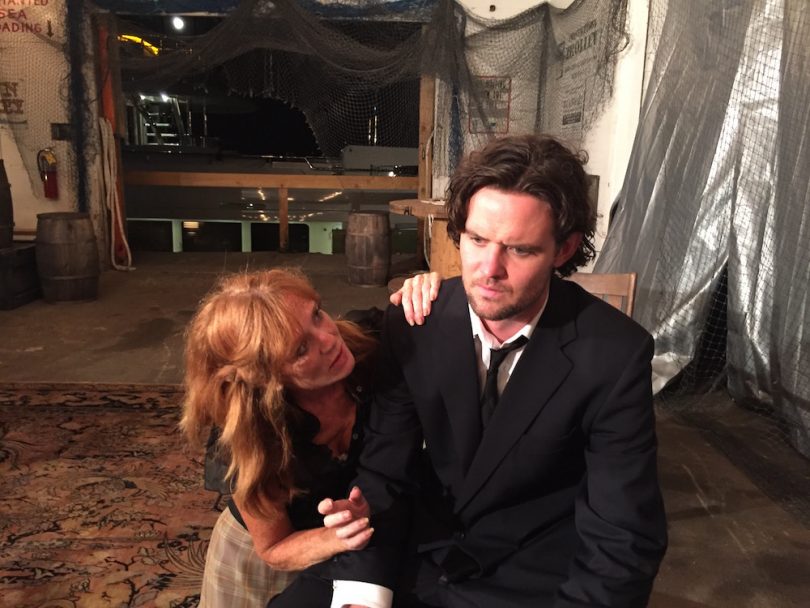
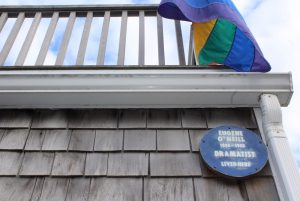



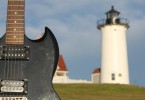





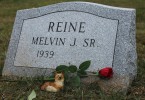



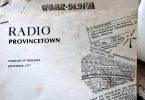








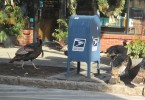





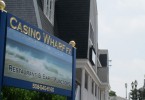

Great article! A real O’Neill guide to his time in Provincetown and Anna Christie!